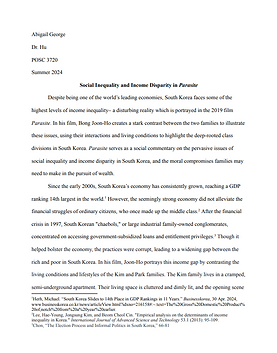Cultural Literacy
This webpage showcases a collection of my written works that explore themes related to cultural literacy. Each piece examines how culture shapes and influences different aspects of society, from consumer behavior and social inequality to emotional expression and tradition. Topics include the impact of Western culture on Chinese consumer habits, the portrayal of class disparity in the film Parasite, cultural approaches to grief in Kitchen, and the interplay between tradition and personal freedom in Shall We Dance?.
Mikage’s Journey in Kitchen and Cultural Perspectives on Grief
Class: Japanese Literature in Translation
Date of Completion: 2/9/2025
In this paper, I explored how Kitchen by Banana Yoshimoto presents a Japanese cultural perspective on grief through the protagonist, Mikage. By comparing Japanese and Western attitudes toward mourning, I analyze how cultural values shape the way grief is experienced and expressed.
The Influence of Western Culture on Chinese Consumer Behavior
Class: East Asian Political Culture
Date of Completion: 6/15/2024
In this paper, I examine how Western culture has influenced modern Chinese consumer behavior, with a focus on the shift away from traditional Confucian values toward individualism and materialism. Through this analysis, I highlight the cultural tensions and transformations that continue to shape China’s evolving marketplace.
Social Inequality and Income Disparity in Parasite
Class: East Asian Political Culture
Date of Completion: 7/14/2024
In this paper, I analyze how Parasite portrays the deep-rooted social inequality and income disparity in South Korea, using the stark contrast between the Kim and Park families to reflect the country’s growing class divide. Through this analysis, I argue that the film serves as a powerful critique of the cyclical nature of poverty and the normalization of corruption in South Korean society.
Japanese Culture in Shall We Dance?
Class: East Asian Political Culture
Date of Completion: 7/24/2024
In this paper, I analyze how Shall We Dance? reflects Japanese cultural norms, particularly the pressure to conform, the influence of Confucian values, and the rigid expectations placed on salarymen. Through this lens, I argue that the film offers a deeper understanding of Japanese interpersonal dynamics and the cost of maintaining social harmony.



